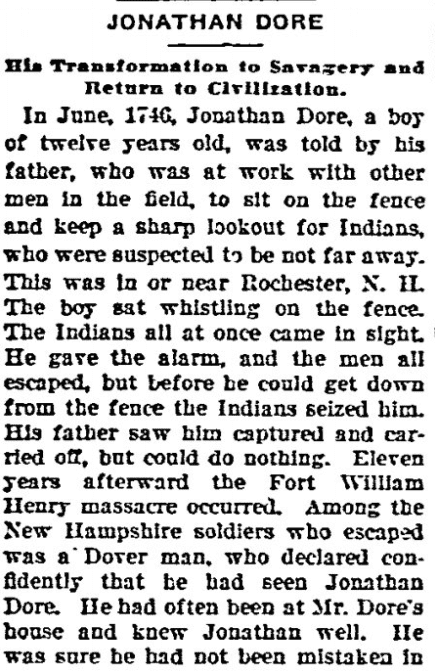Last year I wrote about my relative Elizabeth (Meader) Hanson (1684-1737) who, along with her children, was kidnapped by Abenaki Indians on 7 September 1724 and taken to the Indians’ village along the St. Francis River in Canada. They were held there for over two years. (See: Find & Preserve Your Family’s Stories.)
Powerful. Memorable. That story has been told and retold in our family for the past 290 years. Every night when we were young we asked our grandfather to tell us that story. We loved it. It was real—it was our family story.
Indian Raids Continued
Recently I found this 1749 newspaper article with a report from Timothy Brown about his attempts to learn more about—and to free—captives still held by the Indians.
He was able to get in and around the Abenaki village and learned about multiple captives, including this specific reference:
There is also a Boy who was taken from Rochester in New Hampshire, with the Indians at St. Francois, his Name is Jonathan Dore.

Jonathan Dore?
Rochester, New Hampshire?
St. Francis Indians?
This is sounding just like the story of my relative Elizabeth Hanson, who was also taken prisoner by the Abenaki Indians from St. Francis.
This Jonathan Dore has to be one of my relatives, too—the same Jonathan Dore who was my 5th-great uncle.
New England Had Had Enough
The Abenaki and the French were taking American women and children captive so that they could sell them back to their families.
It was time to stop these atrocities—and that was one of the reasons the French & Indian War was launched (1754-1763).
Attack on Fort William Henry
During the war there was an attack on Fort William Henry in August of 1757.
The following account comes from Terror in Rochester by Linda Sargent, 2008:
“The fort was manned by the British, including many New Hampshire men. The siege had ended and the British had surrendered the fort to the French who were being aided by the Indians. There are various accounts of what happened next, but British soldiers were massacred after they had surrendered.
“One man who managed to escape from the fort was from Dover, NH. When he returned to Dover, he told how he had been pursued by Indians. One of them had caught up to him and lifted his tomahawk.
“When their eyes met, under the war paint and Indian dress he recognized the eyes of a young boy he had known well when he worked as a teamster logging on the Salmon Falls River and visiting at the Dore’s home in Rochester. He knew this white Indian was Jonathan Dore. Jonathan recognized him, as well, and dropped his tomahawk to his side and left. No one believed the man’s story when he returned to Dover.”
See: http://bit.ly/Vj2ZVD
Jonathan Dore had been sighted again, 11 years after he was taken by the Abenaki.
New Englanders Settle the Score
The Abenaki had been terrorizing New Englanders for decades. The old scores were settled on 4 October 1759 when Robert Rogers and his Rangers attacked the Indians’ village.
The following account comes from Wikipedia:
“Rogers and about 140 men entered the village, which was reportedly occupied primarily by women, children, and the elderly, early that morning, slaughtered many of the inhabitants where they lay, shot down many who attempted to flee, and then burned the village. Rogers and his men endured significant hardships to reach the village from the British base at Fort Crown Point in present-day New York, and even more hardship afterwards. Chased by the French and vengeful Indians, and short on rations, Rogers and his men returned to Crown Point via the Connecticut River valley.”
Jonathan Dore Witnessed Rogers’ Attack on the Abenaki Village
Digging deeper into GenealogyBank’s archives, I found out more of the story.

The above historical newspaper clipping is only part of the long account about Jonathan Dore that appeared in the Aberdeen Daily News. The whole article gives a good overview of what had happened to Jonathan Dore.
According to the article, Jonathan Dore (1734-1797)—my 5th-great uncle—was kidnapped on “Salmon Falls Road in Rochester [New Hampshire]” by the Abenaki on 26 June 1746, when he was only 12 years old!
Jonathan Dore married an Abenaki Indian woman and they had two children. When Major Robert Rogers attacked their village in 1759 to avenge the attack on Fort William Henry, Jonathan Dore “witnessed the massacre.”
Everyone in the village was killed and it was set on fire. “Among the ruins he found the bodies of his wife and children. He buried them in one grave and with them his attachment to the Indians.”
In 1760 Jonathan Dore returned home to Rochester, New Hampshire. His family had moved across the Salmon Falls River to Lebanon, Maine, where he also settled.
The newspaper article concluded:
He settled in Lebanon, Me., married again and spent there the remainder of his days, famous for his marksmanship, especially with the bow and arrow, and known to every one as “Indian Dore.”
Wow—we would have loved to have heard that family story as kids!
Our “uncle” was not much older than we were when he was captured by the Indians, and then held captive for over 13 years—what a great story.
Preserve your family’s stories.
Find them in the old newspapers in GenealogyBank’s Historical Newspaper Archives—preserve those stories and pass them down to the rising generation.
Related Family Story Articles:
- Family History Fact Finding: True Family Stories in Newspapers
- Genealogy Is Family Stories & Newspapers Are Full of Them
- Finding Our Family’s Stories in Newspapers—Even the Children
[bottom_post_ad]
